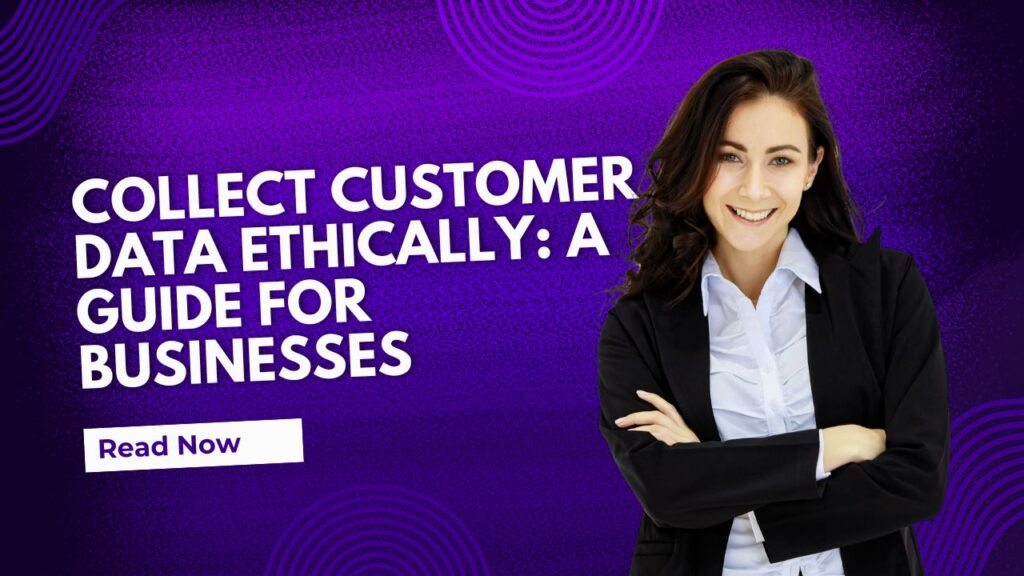In today’s data-driven world, customer information is a goldmine for businesses. It fuels personalization, streamlines marketing efforts, and unlocks valuable insights that drive growth. However, collecting customer data comes with a big responsibility. Customers are increasingly aware of their data privacy and expect businesses to handle their information ethically.
Did you know that 80% of customers are likelier to do business with a company that provides personalized experiences? [Source: Salesforce] That statistic alone underscores the importance of ethical data collection. It’s not just about complying with regulations; it’s about building trust and fostering long-term customer loyalty.
Table of Contents
Why Ethical Data Collection Matters
So, why should ethical data collection be a top priority for your business? Here are a few compelling reasons:
Customer Trust & Loyalty:
In today’s age of data breaches and privacy issues, customers are wary of companies that mishandle their information. By being transparent about your data collection practices and obtaining informed consent, you build trust and establish yourself as a brand customers can rely on. This includes collecting customer data in a responsible way that respects privacy. By following these principles, you’ll cultivate repeat business, positive word-of-mouth marketing, and a loyal customer base.
Legal Compliance:
Data privacy regulations like the General Data Protection Regulation (GDPR) and the California Consumer Privacy Act (CCPA) are becoming increasingly stringent. Failing to comply with these regulations can result in hefty fines and damage your brand reputation. By prioritizing ethical data collection, you avoid legal pitfalls and operate with peace of mind.
Brand Reputation:
News travels fast, especially online. Unethical data collection practices can quickly turn into PR nightmares. A single data breach or privacy violation can erode customer trust and damage your brand reputation for years to come. Ethical data collection demonstrates your commitment to customer privacy, positioning you as a responsible and trustworthy company.
Key Principles of Ethical Data Collection: Building a Customer-Centric Approach
Now that we’ve established the importance of ethical data collection, let’s dive into the core principles that guide this approach:
Transparency & Consent:
Always be upfront with customers about what data you collect, why you collect it, and how you use it. This information should be readily available in a clear and concise privacy policy. Most importantly, obtain explicit consent from customers before collecting their data. This can be achieved through opt-in checkboxes, clear language on forms, and easy-to-understand explanations.
Minimization & Purpose:
Don’t fall into the data trap of “more is better.” Only collect the data that’s necessary to achieve a specific purpose. Inform customers about that purpose and avoid collecting extraneous information you don’t intend to use. This demonstrates respect for their privacy and reduces the risk of data breaches.
Security & Storage:
Customer data is a valuable asset, and you have a responsibility to protect it. Implement robust security measures to safeguard information from unauthorized access, leaks, or breaches. Store data securely using industry-standard practices and encryption protocols. Remember, a data breach can destroy trust faster than you can rebuild it.
Putting it into Practice: Actionable Tips for Ethical Data Collection
Understanding the principles is great, but how do you translate them into practical action? Here are some actionable tips to get you started:
Craft a Clear & Concise Privacy Policy:
Your privacy policy is your customer’s guide to your data practices. Make it easy to find, written in plain language, and avoid legalese. Clearly outline what data you collect, how you use it, and with whom you share it (if applicable). Don’t forget to address how long you retain data and how customers can access or control their information.
Opt-in Options & Unsubscribe Mechanisms:
Empower your customers! Provide clear opt-in options for data collection at every touchpoint, whether it’s on your website, during checkout processes, or through email marketing sign-ups. Equally important, make it easy for customers to unsubscribe from marketing communications. One-click unsubscribe options and clear instructions build trust and demonstrate respect for customer preferences.
Data Minimization Strategies:
Take a critical look at all your data collection practices. Are you asking for information you don’t truly need? Can you streamline online forms to collect only essential data? By minimizing data collection at the source, you lessen the burden on your customers and reduce the risk of storing unnecessary information.
Addressing Common Customer Concerns about Data Privacy
Offer Transparency & Control:
Give customers options to control their data. Allow them to access their information, request corrections, and even opt for complete data deletion (within legal boundaries). This empowers customers and demonstrates your commitment to their privacy.
Prioritize Security & Address Breaches:
Invest in robust data security measures and prioritize ongoing maintenance. In the unfortunate event of a data breach, be transparent and proactive with communication. Inform affected customers promptly, explain the steps you’re taking to address the issue and offer solutions to minimize any potential harm.
Humanize Your Approach:
Data privacy can feel impersonal, but it doesn’t have to be. Use clear, human-centric language when communicating about data practices. Avoid technical jargon and focus on building a relationship of trust with your customers.
Conclusion
In today’s competitive landscape, ethical data collection isn’t just a best practice, it’s a strategic imperative. By prioritizing customer trust, transparency, and security in your data collection practices, you build a foundation for long-term customer loyalty. Remember, happy and empowered customers are your biggest brand advocates.
Take the first step towards ethical data collection today! Review your current practices and identify areas for improvement. Craft a clear and comprehensive privacy policy, implement opt-in options and easy unsubscribe mechanisms, and prioritize data security. These actions demonstrate your commitment to customer privacy and position your business for success in the age of transparency.



